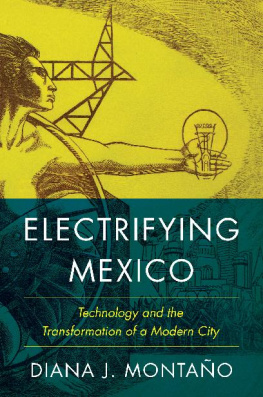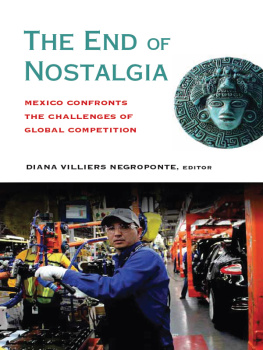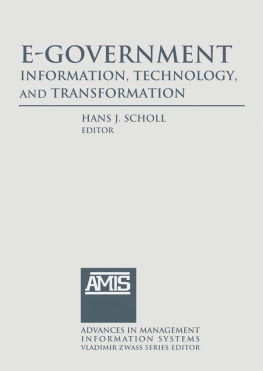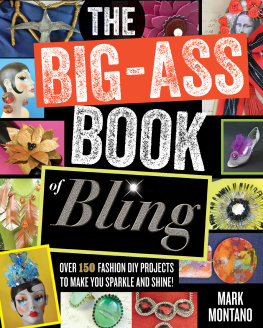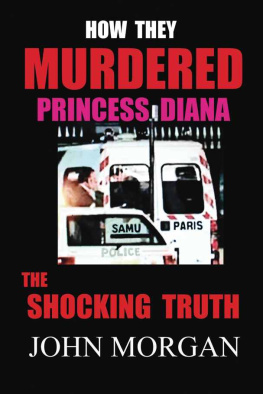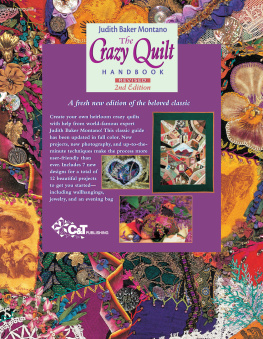Joe R. and Teresa Lozano Long Series in Latin American and Latino Art and Culture
Electrifying Mexico
TECHNOLOGY AND THE TRANSFORMATION OF A MODERN CITY
DIANA J. MONTAO
University of Texas Press
AUSTIN
Copyright 2021 by the University of Texas Press
All rights reserved
First edition, 2021
Parts of appeared previously, in a different form, in Ladrones de Luz : Policing Electricity in Mexico City, 19011918, Hispanic American Historical Review 101, no. 1 (2021): 3572.
Requests for permission to reproduce material from this work should be sent to:
Permissions
University of Texas Press
P.O. Box 7819
Austin, TX 78713-7819
utpress.utexas.edu/rp-form
LIBRARY OF CONGRESS CATALOGING-IN-PUBLICATION DATA
Names: Montao, Diana, author.
Title: Electrifying Mexico : technology and the transformation of a modern city / Diana J. Montao.
Description: First edition. | Austin : University of Texas Press, 2021. | Includes bibliographical references and index.
Identifiers:
LCCN 2021008822
ISBN 978-1-4773-2345-8 (cloth)
ISBN 978-1-4773-2346-5 (library ebook
ISBN 978-1-4773-2347-2 (ebook)
Subjects: LCSH: ElectrificationMexicoHistory19th century. | ElectrificationMexicoHistory20th century. | ElectrificationSocial aspectsMexico. | Electric power consumptionMexicoHistory. | MexicoSocial conditions20th century.
Classification: LCC HD9685.M62 M66 2021 | DDC 333.793/209720904dc23
LC record available at https://lccn.loc.gov/2021008822
doi:10.7560/323458
Contents
Acknowledgments
Along an arduous pilgrimage, one accumulates unpayable debts. In conceptualizing, researching, analyzing, and writing this book, the author has found sustento (support/nourishment) from expected and unexpected quarters. I have struggled to do justice to the many individuals that have entered my life and have influenced me intellectually, academically, and personally.
It is only fair and necessary to begin by thanking William H. Beezley, whose mentorship has guided me for over fifteen years, a quinceaera in Mexican years. From supporting my ambitious masters thesis that took me from the state of Michoacn in western Mexico to East Los Angeles to drifting toward the field of history, to advocating for a semester abroad at El Colegio de Mxico, to planting the seed for this book over thirteen years ago, the book in your hands bears the footprint of his strength as an academic mentor. He has been an engaged reader and commentator whose questions, concerns, and never-ending quejas made this book a better one. For that alone, he deserves a sack of chitepines . However, his enthusiasm for everything Mexico, for his incessant pursuit to do cultural history, I thank him the most. As many Latin Americanists trained at the University of Arizona, I was privileged to work with Kevin Gosner and Bert J. Barickman, whose intellectual rigor and dedication to teaching have become a guiding example. It pains that BJB left us too early. His brilliance and inquisitiveness have left an indelible mark, as has the singing of the hymn ao Senhor do Bonhim in the middle of the O Lugar Desprovido de Anchovas surrounded by strangers. I hold dearly the memory of him walking up and down the halls of a full auditorium around anxious undergrads immersed in their finals with my one-year-old son in arms exuded his kindness and effort of practicing inclusiveness.
I am especially indebted to Susie S. Porter, John Lear, and Andrea Friedman, whose intellectual kindness and generosity know no bounds. Susie championed the metamorphosing from a dissertation into the book. She commented perceptively on various drafts offering substantive feedback, and her work on working women in Mexico City encouraged me to cultivate grounded analysis. Her eagerness to workshop the manuscript along with John Lear at a critical juncture kindled its subsequent revision. Johns work energized the visual analysis and a deeper dive into the electrical workers union archives for correspondingly through their insightful remarks and recommendations. William E. French offered invaluable help in the crafting of the books architecture. Javier Duran deserves special recognition for his ongoing mentorship, critiques and for making me consider graduate school in the first place. Mil gracias .
I have been privileged to present pieces of this project to variegated audiences over the years. Individual chapters were workshopped thanks to William H. Beezley and David Pretel, who opened their graduate courses. Christiane Berth and Yovanna Pineda invited me onboard the workshop they organized at the University of Bern on the role of users in global technological history. Over two intensive days, feedback and conversations with Leida Fernndez-Prieto, Mikael Hrd, Clapperton Mavhunga, and Suzanne Moon provided ideas to improve . A later version of that chapter benefited from the sharpened eyes of David Pretel and Fabin Prieto-aez.
Senior colleagues in the Department of History have injected enthusiasm for this project. Jean Allman, Monique Bedasse, Liz Borgwardt, Daniel Bornstein, Shefali Chandra, Alexander Dub, Douglas Flowe, Christine Johnson, Peter Kastor, Sowande Mustakeem, Christina Ramos, Nancy Reynolds, Corinna Treitel, Anika Walke, and Lori Watt have all earned my heartfelt gratitude. I have felt incredibly energized by the collegiality of Andrea Friedman, Jean Allman, Shefali Chandra, and Nancy Reynolds, who have celebrated and engaged directly in the projects development. Liz Borgwardt also deserves an extra thanks for sharing her excitement about the book with Kathryn Lofton, who found its description utterly fascinating and put me in touch with the University of Texas Press. Across Washington University in St. Louis, I have found a stable intellectual community. I have benefited from the collegiality of William Acree, Mark Beirn, Adrienne Davis, Rene Esparza, Bret Gustafson, Mabel Moraa, Ignacio Snchez Prado, Winnie Poster, Luis Salas, Akiko Tsuchiya, Miguel Valerio, Rebecca Wanzo, Helina Woldekiros, and Rafia Zafar. Special thanks to Sonia Lee, Andrea Friedman, Anika Walke, and Trevor Sangrey, who added chairs to their tables to welcome my family. My academic siblings Christina Ramos, Bahia Munem, and Miguel Valerio have collectively been a bedrock for the last few years. Thanks to each of you for the meals, laughs, and advice. I am incredibly thankful to Christina for entrusting me with her aunts recipes, for her sabor , and for walking alongside as a loyal hermana .
Several institutions have funded my education and research. At the University of Arizona, the Tinker Foundation, the Social and Behavioral Science Research Institute, the Hanson Film Institute, and the Confluencenter for Creative Inquiry financed research at critical moments. My graduate education benefited greatly from the Graduate College Minority Fellowship, one of the many hard-fought accomplishments of the late Mara Teresa Velez, a role model for many women in academia and a fervent advocate for furthering diversity in higher education. A Greenleaf Visiting Library fellowship at the University of New Mexico granted me the opportunity to research cookbooks and culinary ephemera and present early findings to an engaged audience. At Washington University in St. Louis, a generous postdoctoral fellowship in the Department of History and a First Book Fellowship at the Center for the Humanities have provided the institutional and financial support to further my research agenda. Ignacio Infante, Barbara Liebmann, Tila Neguse, Shefali Chandra, and the other scholars in my cohort provided the ideal environment to polish the following pages arguments and writing. The manuscript greatly benefited from their engaged reading and vibrant discussion. I appreciate their participation in the manuscript workshop and that of Deborah Cohen, Andrea Friedman, Winnie Poster, Christina Ramos, Nancy Reynolds, and Miguel Valerio. Infinitas gracias to Susie S. Porter and John Lear for leading us that day.


